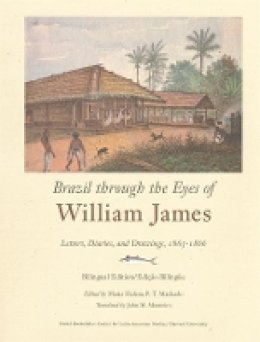
Brazil through the Eyes of William James: Diaries, Letters, and Drawings, 1865-1866 (David Rockefeller Center for Latin American Studies)
William James
In 1865, twenty-three-year-old William James began his studies at the Harvard Medical School. When he learned that one of his most esteemed professors, Louis Agassiz, then director of the recently established Museum of Comparative Zoology, was preparing a research expedition to Brazil, James offered his services as a voluntary collector. Over the course of a year, James kept a diary, wrote letters to his family, and sketched the plants, animals, and people he observed. During this journey, James spent time primarily in Rio de Janeiro, Belem, and Manaus, and along the rivers and tributaries of the Amazon Basin.
This volume is a critical, bilingual (English–Portuguese) edition of William James’s diaries and letters and also includes reproductions of his drawings. This original material belongs to the Houghton Archives at Harvard University and is of great interest to both William James scholars and Brazilian studies experts.
Product Details
About William James
Reviews for Brazil through the Eyes of William James: Diaries, Letters, and Drawings, 1865-1866 (David Rockefeller Center for Latin American Studies)
Peter Skinner
ForeWord
This beautifully produced bilingual volume brings together William James’s letters, diaries, and drawings from his eight-month trip to Brazil in 1865–66… Machado’s tracing of the trip, and her detailed background on the participants, make this book a significant addition to James studies.
Amalie Kass
New England Quarterly
Machado’s bilingual edition Brazil through the Eyes of William James expertly gathers and examines James’ sketches, written correspondence and diaries produced during the Thayer Expedition to the Amazon basin in 1865 and 1866, offering a fascinating glimpse into the formative voyage of one of North America’s preeminent thinkers. While adding to an important body of travel literature set in Brazil that spans from the early colonial era (Hans Staden) to the 20th century (Claude Lévi-Strauss), Harvard’s handsomely illustrated volume offers a comprehensive cultural and historical critique of the expedition and its participants, contributing to a greater understanding of U.S.-Brazilian relations amid the contentious political climate of the U.S. Civil War Era.
Jason Borge
AmeriQuests
